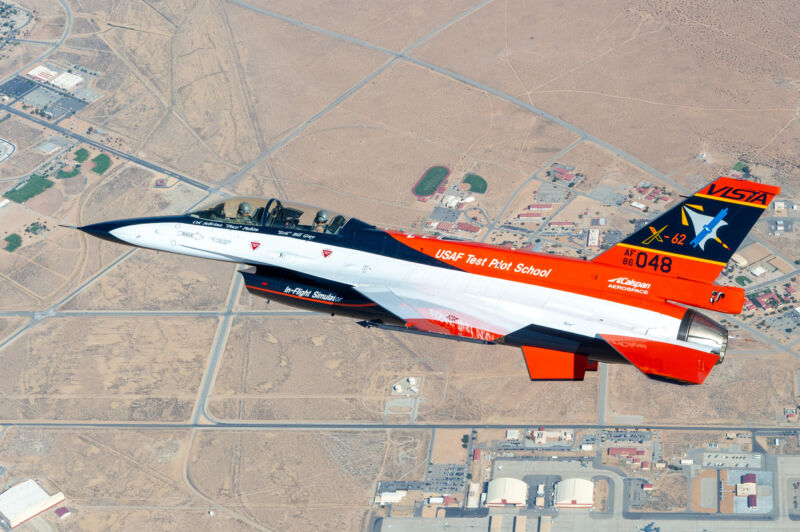no breaking the hard deck —
After flying against simulated opponents, the AI agent has taken on humans.

Enlarge / The X-62A VISTA Aircraft flying above Edwards Air Force Base, California.
Kyle Brasier, U.S. Air Force
An AI test pilot has successfully flown a jet fighter in dogfights against human opponents. It’s the latest development for DARPA’s Air Combat Evaluation program, which is trying to develop aerospace AI agents that can be trusted to perform safely.
Human test pilots have a bit of a reputation thanks to popular culture—from The Right Stuff to Top Gun: Maverick, the profession has been portrayed as a place for loose cannons with a desire to go fast and break the rules. The reality is pretty far from that these days, especially where DARPA is concerned.
The agency instead wants a machine-learning agent that can safely fly a real aircraft autonomously, with no violations of training rules. After all, neural networks have their own reputation—at this point well-earned—for finding ways to exploit situations that hadn’t occurred to humans. And the consequences when controlling a real jet fighter can be a lot more severe than just testing in silico.
In this case, the jet fighter is called the X-62A Variable Stability In-Flight Simulator Test Aircraft, or VISTA. It began life as an F-16D (Block 30) two-seater, which spent most of its 32-year career working at the US Air Force Test Pilot School at Edwards AFB.
Over the years, the plane, previously designated the NF-16D, has been modified to simulate the flight characteristics of other aircraft while in flight. “It has given almost a thousand students and staff members the opportunity to practice testing aircraft with dangerously poor flying qualities and to execute risk-reduction flight test programs for advanced technologies,” said William Gray, chief test pilot of VISTA and the USAF Test Pilot School.
That made it a natural candidate for DARPA’s ACE program, and in 2021, the process of modifying the aircraft began once again as it became the X-62A.
The USAF and DARPA started conducting X-62A test flights under AI control in December 2022, logging 17 hours by the time we first learned of the program in early 2023. Although DARPA’s AI agent flew the X-62A, there was always a pair of human pilots onboard to monitor the test flight and, if necessary, take control. But in those early tests, the X-62A flew against simulated adversaries.
By September 2023, the program had completed 21 test flights, including the first-ever AI versus human aerial engagement within visual range, flying against a human-piloted F-16. During that time, DARPA says the team made over 100,000 lines of flight-critical software changes, which it called “an unprecedented rate of development.”
That’s certainly an achievement, but just focusing on the dogfight is a mistake, according to Gray. “That misses the point. Dogfighting was the problem to solve so we could start testing autonomous artificial intelligence systems in the air, but every lesson we’re learning applies to every task we can give to an autonomous system,” he said.